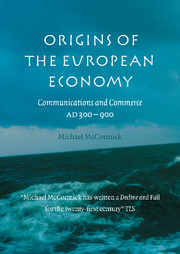Book contents
- Frontmatter
- Dedication
- Contents
- List of maps
- List of figures
- List of tables
- List of charts
- Preface
- List of abbreviations
- Commerce, communications, and the origins of the European economy
- PART I THE END OF THE WORLD
- PART II PEOPLE ON THE MOVE
- PART III THINGS THAT TRAVELED
- 10 Hagiographical horizons: collecting exotic relics in early medieval France
- 11 “Virtual” coins and communications
- 12 Real money: Arab and Byzantine coins around Carolingian Europe
- Things that traveled
- PART IV THE PATTERNS OF CHANGE
- PART V COMMERCE
- Appendices
- Bibliography
- Index
10 - Hagiographical horizons: collecting exotic relics in early medieval France
from PART III - THINGS THAT TRAVELED
Published online by Cambridge University Press: 05 February 2015
- Frontmatter
- Dedication
- Contents
- List of maps
- List of figures
- List of tables
- List of charts
- Preface
- List of abbreviations
- Commerce, communications, and the origins of the European economy
- PART I THE END OF THE WORLD
- PART II PEOPLE ON THE MOVE
- PART III THINGS THAT TRAVELED
- 10 Hagiographical horizons: collecting exotic relics in early medieval France
- 11 “Virtual” coins and communications
- 12 Real money: Arab and Byzantine coins around Carolingian Europe
- Things that traveled
- PART IV THE PATTERNS OF CHANGE
- PART V COMMERCE
- Appendices
- Bibliography
- Index
Summary
The problem of early medieval relics
When … we saw the aforementioned churches [of the monastery of St. Riquier] established … we were fired by great desire and excessive ardor of love that … we might deserve to acquire a portion of the relics of the saints to adorn the same holy churches of God. Wherefore we have strained to labor with all our forces and all our mind, with the help of almighty God and the assistance of my glorious Lord, the great Emperor [Charles], so that from the various regions of the whole of Christendom we could deposit in this holy place as many [relics], of such kind and brought from such places as the following shows.
In the first place, [the relics] brought to us from the holy Roman church, given by the supreme pontiff Hadrian, of good memory, and after him, by the venerable Leo, Roman pope; from Constantinople and Jerusalem, by the ambassadors sent there by my Lord. And next [relics] sent to us from Italy, Germany, Aquitaine, Burgundy, and Gaul by the most holy Fathers, viz., Patriarchs, Archbishops, and Bishops and Abbots, as well as from the sacred Palace, which [relics] had been collected through the ages by kings, and thereafter especially by my aforesaid Lord. Thanks to his pious gift, we were entitled to get a portion of all of them and to deposit them in worthy fashion in this holy place.
- Type
- Chapter
- Information
- Origins of the European EconomyCommunications and Commerce AD 300–900, pp. 283 - 318Publisher: Cambridge University PressPrint publication year: 2002



